10 Best Fruits To Reduce Inflammation
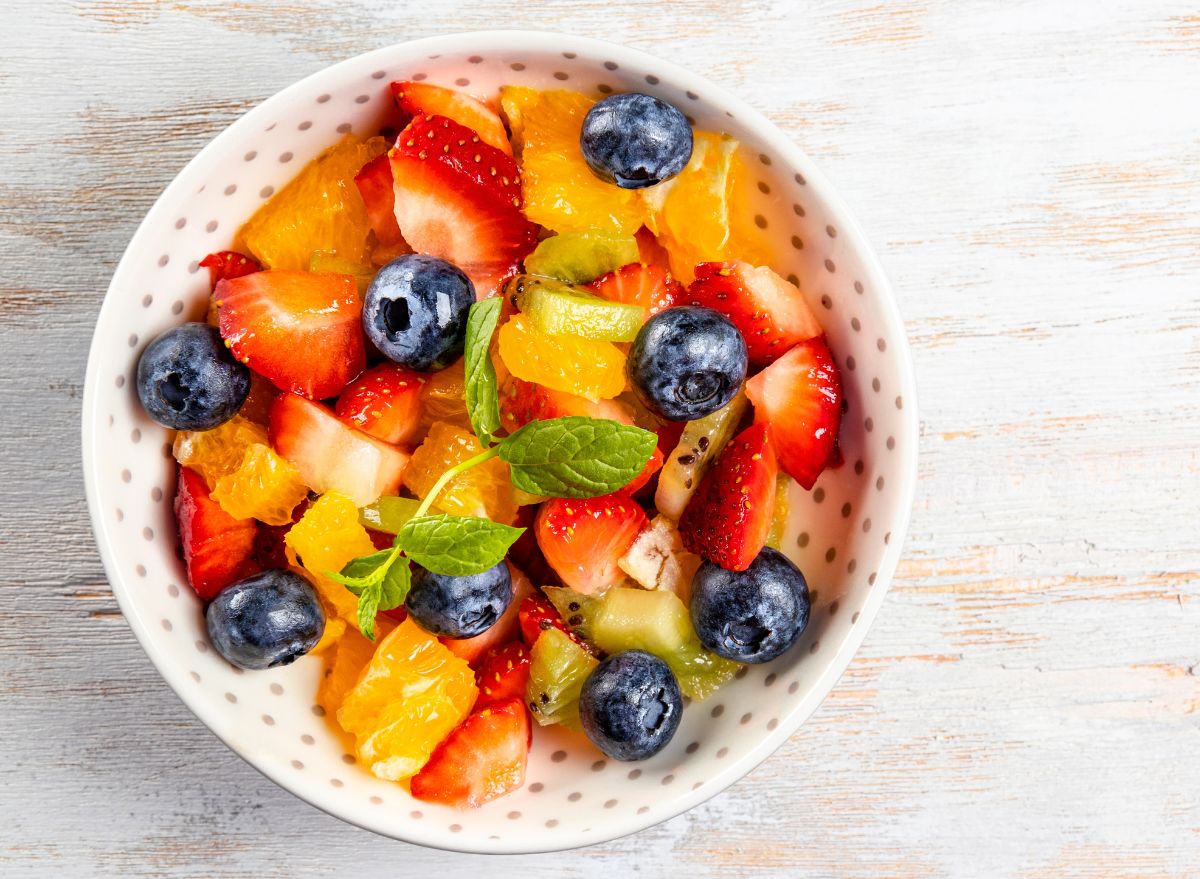
Looking to reduce inflammation and boost your health? If so, you’ve come to the right place. While plenty of healthy lifestyle habits help combat inflammation, such as regular exercise, getting enough sleep, and stress management, incorporating more fruits into your diet is one of the most effective (and delicious) ways to do so.
Fruits are packed with essential nutrients like vitamins, minerals, antioxidants, and fiber that can help fight inflammation. Additionally, the nutrients found in fruit can boost your immune system, regulate blood pressure, and offer antibacterial and antiviral properties to keep you feeling amazing.
While inflammation is a natural response by the immune system, chronic inflammation can lead to various health issues, including heart disease, type 2 diabetes, and cancer. Fortunately, many fruits (like the ones on this list) have anti-inflammatory properties that can help reduce chronic inflammation and lower your risk of chronic disease.
We chatted with Trista Best, RD, a registered dietitian with Balance One Supplements, who revealed the 10 best fruits to reduce inflammation and boost your overall health. Whether you enjoy them on their own as a snack, blended into smoothies, or as part of a meal, these fruits can be a delicious addition to your anti-inflammatory diet. Read on, and next up, don’t miss The 10 Healthiest Drinks To Sip, According to Dietitians.
Berries
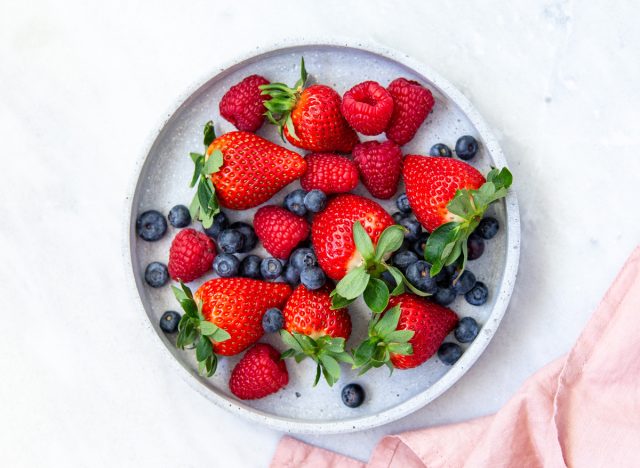
Berries like blueberries, strawberries, raspberries, and blackberries are rich in antioxidants such as flavonoids, which animal studies have shown can help reduce inflammation in the body. “Berries are packed with antioxidants and anti-inflammatory compounds like flavonoids and vitamin C, which help combat inflammation and oxidative stress in the body,” Best explains. “Incorporating a variety of berries into your diet can support overall health and reduce the risk of chronic diseases.”
Pineapple
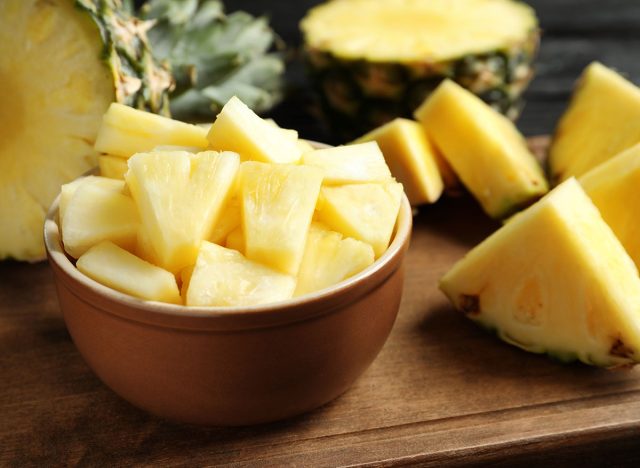
This tropical fruit contains bromelain, an enzyme with powerful anti-inflammatory properties that can help reduce swelling and bruising. Pineapple is also a good source of vitamin C (providing 48 milligrams per 100-gram serving, per the USDA), which can help strengthen your immune system.
Best says, “Due to its digestive enzyme content, consuming pineapple or its juice regularly can help alleviate inflammation, particularly in conditions like arthritis, and promote digestive health.”
Avocado
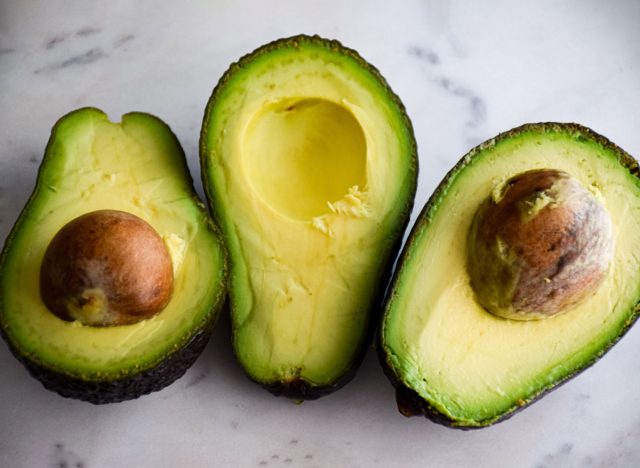
While many people mistakenly consider avocados a vegetable, they’re actually a fruit that research suggests has the potential to help combat inflammation. “Avocados are rich in monounsaturated fats and antioxidants like vitamin E, which have been shown to reduce inflammation and support heart health,” says Best. “Adding avocados to your diet can also help regulate blood sugar levels and promote satiety, making them a versatile and nutritious fruit choice.”
Oranges
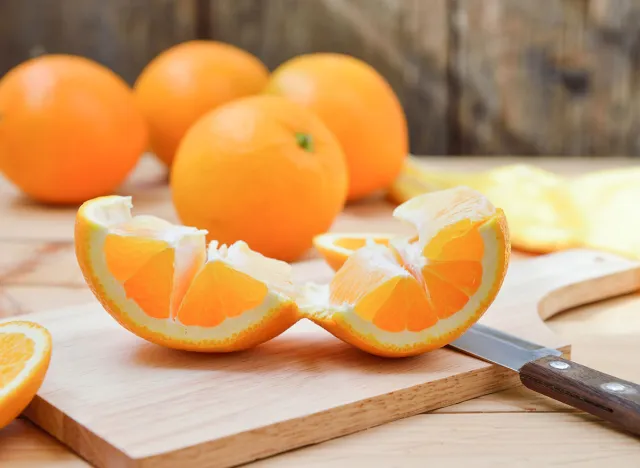
Oranges are a beloved fruit and an excellent source of vitamin C. According to a 2015 study, taking just 500 milligrams of vitamin C twice daily can help reduce inflammation and boost your immune system.
“Oranges are abundant in vitamin C, a powerful antioxidant that helps reduce inflammation by neutralizing free radicals in the body. Additionally, the flavonoids found in oranges have anti-inflammatory effects and may contribute to cardiovascular health and immune function,” says Best.
Papaya
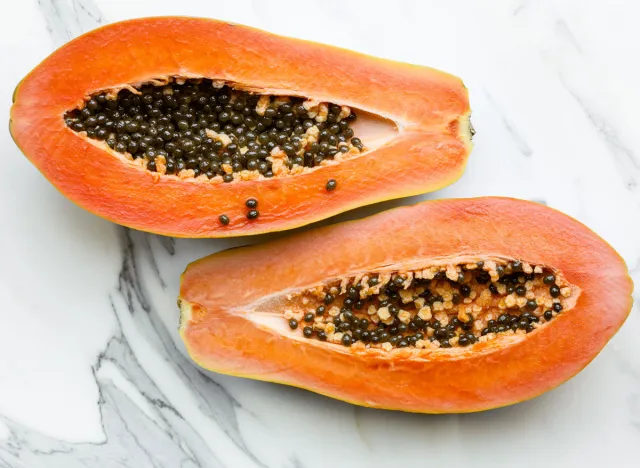
Papaya contains an enzyme called papain, which one animal study suggests has anti-inflammatory properties for improving digestive health. Best tells us, “Papaya contains papain, an enzyme similar to bromelain found in pineapple, which possesses anti-inflammatory properties and aids digestion. This tropical fruit is also rich in vitamin C, beta-carotene, and other antioxidants, making it a valuable addition to an anti-inflammatory diet.”
Cherries
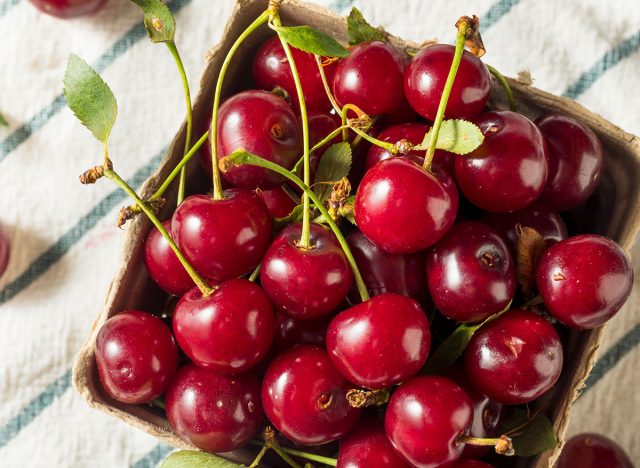
Cherries are rich in antioxidants called anthocyanins, which have been shown to reduce inflammation and may help alleviate symptoms of arthritis and gout. “Cherries, especially tart cherries, are renowned for their high levels of anthocyanins, which have potent anti-inflammatory effects. Consuming cherries or cherry juice may help reduce muscle soreness, alleviate arthritis symptoms, and lower levels of inflammatory markers in the body,” states Best.
Apples
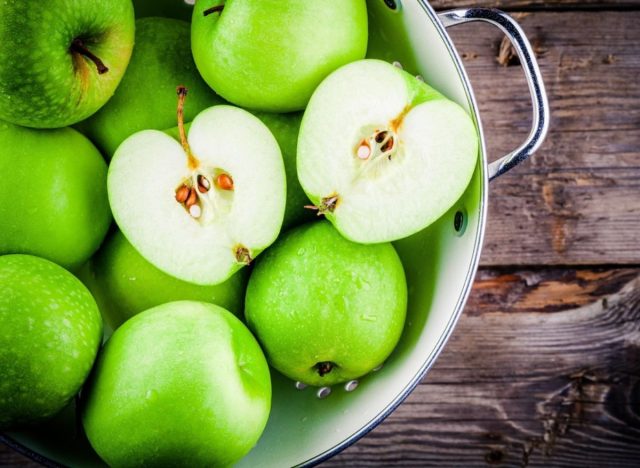
Apples are high in fiber and antioxidants, which, according to a 2023 review, can help reduce inflammation and improve digestion. “Apples are a good source of quercetin, a flavonoid with anti-inflammatory and antioxidant properties,” explains Best. “Due to their high fiber and phytonutrient content, Eating apples may help reduce inflammation, protect against heart disease, and support lung function.”
Kiwi
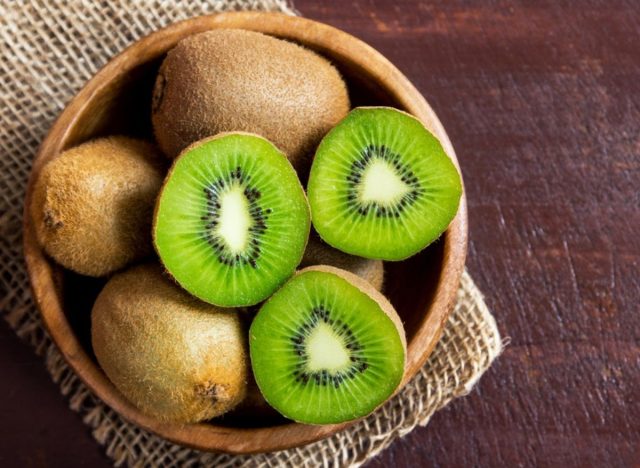
Packed with 93 milligrams of vitamin C per 100-gram serving, kiwi is a fantastic fruit for fighting inflammation since its antioxidant properties help optimize your immune health.
“Kiwi is rich in vitamin C, vitamin E, and polyphenols, all of which contribute to its anti-inflammatory properties. Incorporating kiwi into your diet can help reduce inflammation, improve digestion, and support immune function due to its high nutrient density,” says Best.
Watermelon
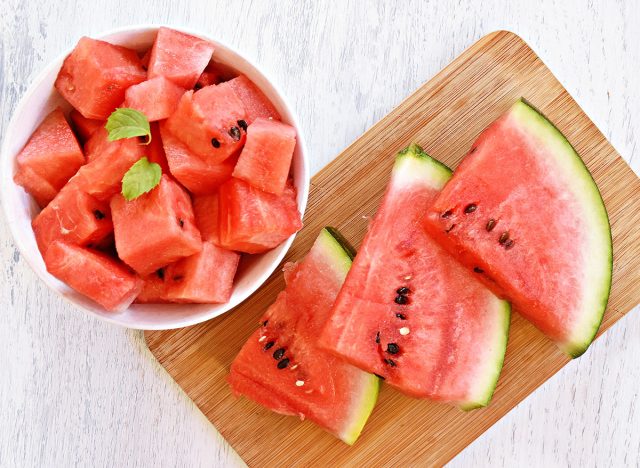
This delicious summertime fruit contains a potent antioxidant called lycopene. According to a 2021 study, lycopene may help reduce inflammation, improve brain health, and protect against certain diseases.
“Watermelon contains lycopene, which can reduce the risk of chronic diseases like heart disease and cancer,” says Best. “Additionally, watermelon is hydrating and low in calories, making it a refreshing and nutritious choice for combating inflammation.”
Grapes
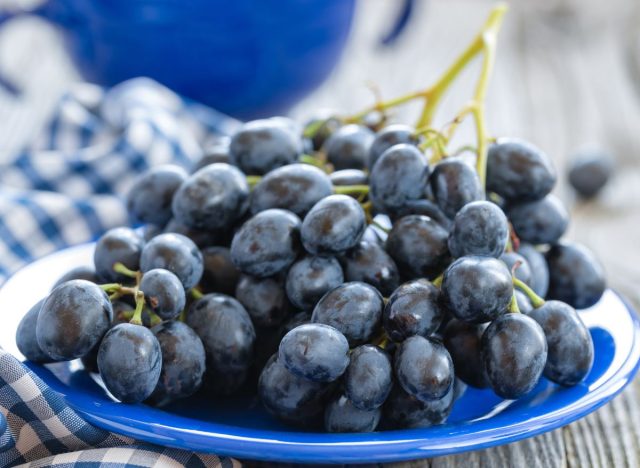
Grapes contain antioxidants called polyphenols, which research indicates can help lower inflammation and slash your chronic disease risk.
Best says, “Grapes, especially red and purple varieties, contain resveratrol, a compound with anti-inflammatory and antioxidant properties. Consuming grapes or grape products like juice or raisins may help reduce inflammation, protect against heart disease, and support brain health.”
- Source: Zheng, G., Qiu, P., Xia, R., Lin, H., Ye, B., Tao, J., & Chen, L. (2019). Effect of Aerobic Exercise on Inflammatory Markers in Healthy Middle-Aged and Older Adults: A Systematic Review and Meta-Analysis of Randomized Controlled Trials. Frontiers in aging neuroscience, 11, 98. https://doi.org/10.3389/fnagi.2019.00098
- Source: Dzierzewski, J. M., Donovan, E. K., Kay, D. B., Sannes, T. S., & Bradbrook, K. E. (2020). Sleep Inconsistency and Markers of Inflammation. Frontiers in neurology, 11, 1042. https://doi.org/10.3389/fneur.2020.01042
- Source: Maydych V. (2019). The Interplay Between Stress, Inflammation, and Emotional Attention: Relevance for Depression. Frontiers in neuroscience, 13, 384. https://doi.org/10.3389/fnins.2019.00384
- Source: Majdan, M., & Bobrowska-Korczak, B. (2022). Active Compounds in Fruits and Inflammation in the Body. Nutrients, 14(12), 2496. https://doi.org/10.3390/nu14122496
- Source: Pahwa R, Goyal A, Jialal I. Chronic Inflammation. [Updated 2023 Aug 7]. In: StatPearls [Internet]. Treasure Island (FL): StatPearls Publishing; 2024 Jan-. Available from: https://www.ncbi.nlm.nih.gov/books/NBK493173/
- Source: Land Lail, H., Feresin, R. G., Hicks, D., Stone, B., Price, E., & Wanders, D. (2021). Berries as a Treatment for Obesity-Induced Inflammation: Evidence from Preclinical Models. Nutrients, 13(2), 334. https://doi.org/10.3390/nu13020334
- Source: Insuan, O., Janchai, P., Thongchuai, B., Chaiwongsa, R., Khamchun, S., Saoin, S., Insuan, W., Pothacharoen, P., Apiwatanapiwat, W., Boondaeng, A., & Vaithanomsat, P. (2021). Anti-Inflammatory Effect of Pineapple Rhizome Bromelain through Downregulation of the NF-κB- and MAPKs-Signaling Pathways in Lipopolysaccharide (LPS)-Stimulated RAW264.7 Cells. Current issues in molecular biology, 43(1), 93–106. https://doi.org/10.3390/cimb43010008
- Source: Faramarzi, M., Sadighi, M., Shirmohamadi, A., Kazemi, R., & Zohdi, M. (2023). Effectiveness of Bromelain in the control of postoperative pain after periodontal surgery: A crossover randomized clinical trial. Journal of advanced periodontology & implant dentistry, 15(1), 22–27. https://doi.org/10.34172/japid.2023.002
- Source: Cheng, F., Ford, N., Wood, A., & Tracy, R. (2022). Avocado Consumption and Markers of Inflammation: Results From The Multi-ethnic Study of Atherosclerosis (MESA). Current Developments in Nutrition, 6(Suppl 1), 891. https://doi.org/10.1093/cdn/nzac067.011
- Source: Ellulu, M. S., Rahmat, A., Patimah, I., Khaza'ai, H., & Abed, Y. (2015). Effect of vitamin C on inflammation and metabolic markers in hypertensive and/or diabetic obese adults: a randomized controlled trial. Drug design, development and therapy, 9, 3405–3412. https://doi.org/10.2147/DDDT.S83144
- Source: Kang, Y. M., Kang, H. A., Cominguez, D. C., Kim, S. H., & An, H. J. (2021). Papain Ameliorates Lipid Accumulation and Inflammation in High-Fat Diet-Induced Obesity Mice and 3T3-L1 Adipocytes via AMPK Activation. International journal of molecular sciences, 22(18), 9885. https://doi.org/10.3390/ijms22189885
- Source: Kelley, D. S., Adkins, Y., & Laugero, K. D. (2018). A Review of the Health Benefits of Cherries. Nutrients, 10(3), 368. https://doi.org/10.3390/nu10030368
- Source: Zhang, Y., Zeng, M., Zhang, X., Yu, Q., Zeng, W., Yu, B., Gan, J., Zhang, S., & Jiang, X. (2023). Does an apple a day keep away diseases? Evidence and mechanism of action. Food science & nutrition, 11(9), 4926–4947. https://doi.org/10.1002/fsn3.3487
- Source: Ciacci, C., Russo, I., Bucci, C., Iovino, P., Pellegrini, L., Giangrieco, I., Tamburrini, M., & Ciardiello, M. A. (2014). The kiwi fruit peptide kissper displays anti-inflammatory and anti-oxidant effects in in-vitro and ex-vivo human intestinal models. Clinical and experimental immunology, 175(3), 476–484. https://doi.org/10.1111/cei.12229
- Source: Crowe-White, K. M., Nagabooshanam, V. A., Dudenbostel, T., Locher, J. L., Chavers, T. P., & Ellis, A. C. (2021). 100% Watermelon Juice as a Food-First Intervention to Improve Cognitive Function: Ancillary Findings from a Randomized Controlled Trial. Journal of nutrition in gerontology and geriatrics, 40(4), 304–312. https://doi.org/10.1080/21551197.2021.1988028
- Source: Bocsan, I. C., Măgureanu, D. C., Pop, R. M., Levai, A. M., Macovei, Ș. O., Pătrașca, I. M., Chedea, V. S., & Buzoianu, A. D. (2022). Antioxidant and Anti-Inflammatory Actions of Polyphenols from Red and White Grape Pomace in Ischemic Heart Diseases. Biomedicines, 10(10), 2337. https://doi.org/10.3390/biomedicines10102337